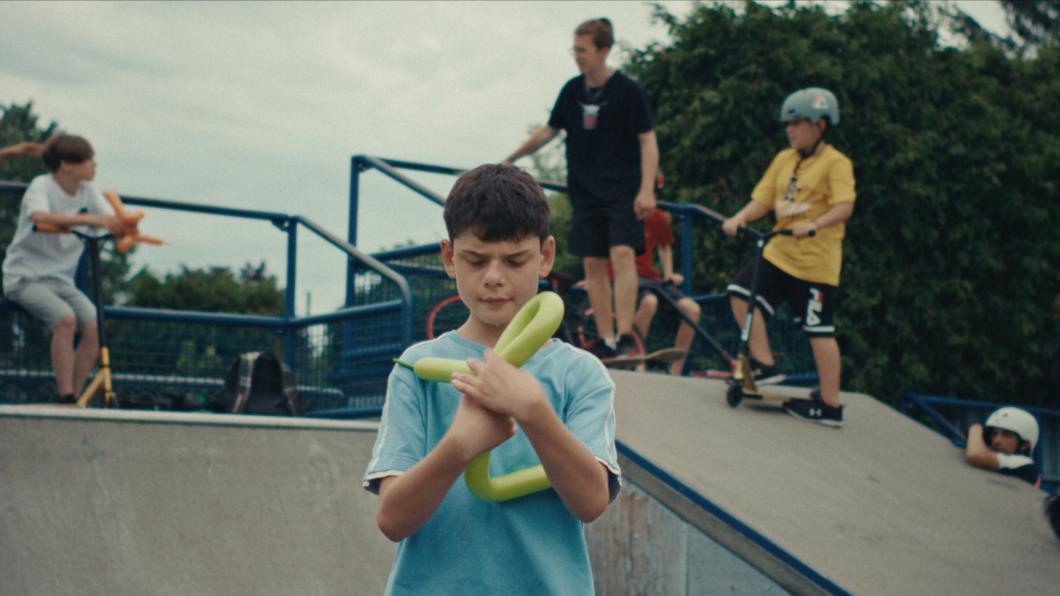
This film about twin brothers has an ableist lens that lacks imagination
By Louise Kinross
I wanted to love this short documentary on The New York Times. It's about twin boys entering their teen years. One, Rémi, is non-disabled and the other, Raphaël, has developmental disabilities that aren't further described. It's visually stunning, and the boys' bond is palpable. But I finished it feeling unsettled. Annoyed.
I clicked on the 100-plus comments, and everyone raved about it. I could not find a negative word
The film contrasts the boys alone together at a cottage—swimming, biking, catching tadpoles, playing cards, sleeping in a tent—with their time at a skateboard park with Rémi's skater friends.
At the cottage, the boys do everything together. They joke around, walk side by side, sit in silence in nature. There are only hints at their differences. Raphaël wears a life jacket and sits on the back of a paddle board Rémi steers. He isn't as coordinated and eventually falls off the board. While playing cards Raphaël discloses that he has an ace, by mistake.
At the skateboard park, Raphaël variously sits alone against a chain-link fence or a wall, or on the side of a jump, watching everyone else speed by and hit air doing whiz-bang tricks and jumps. He also creates a hat by twisting together balloons, which he offers to his brother and his friends. Rémi says "Hey, go away," then another boy humours Raphaël and accepts the hat.
I couldn't help wondering how this particular shoot had been explained to Raphaël. The skateboard park belongs to the cool kids, the super able, athletic kids. Raphaël is a lonely observer in this environment, although we do see one quick shot of Rémi pushing him on a scooter.
Rémi tells us that his brother is in special-ed, but there's no footage of Raphaël, or of both of them, in that environment, or in any place that includes disabled, or otherwise different, people. The skateboard park is the 'normal' world built for able people. There aren't any other visibly disabled kids there, or obvious adaptations for disabled kids. Raphaël is the outsider.
There are short interviews with both boys, but more air time is given to Rémi, who explains that he doesn't see Raphaël as disabled, and it was only that as he grew older that he recognized he was different. He speaks of his love for his brother.
Raphaël is asked: "How well does he take care of you?" It's a closed question that presupposes that Rémi's main role is that of caretaker. Does Raphaël view Rémi primarily as his caregiver? We don't find out, because Raphaël is backed into this corner of having to rate his brother's caregiving skills.
Rémi says he anticipates Raphaël will become more independent over time, so he won't stress about him as much.
Raphaël says, sad and resigned: "Because at some point that's life, we can't be together forever." We don't know what question prompted this response.
The entire film conveys the conventional storyline that living in the mainstream world means that Rémi will go off, leaving his disabled brother behind. The first scene anticipates this. Raphaël intently watches Rémi circling and revving his motorbike. Raphaël stands, wearing a helmet. I initially assumed he had a motorbike, too. Only later do we see Raphaël is a passenger on the bike. The final scene hints at further separation.
I went back and read the blurb about the film. The filmmaker Justine Martin used to babysit the boys as younger children. I assume she is non-disabled. The film didn't leave me thinking, because the storyline was predictable and inevitable. There was no opening for something unconventional to happen. I couldn't help wondering how the film would have gone if there were disabled people producing it. All I was left with was: We live in an ableist world. No one cares about respecting disabled people's agency. No one is invested in changing the built world or social attitudes. Eventually, even a brother who deeply loves his twin will be sucked into the world of normalcy.
Maybe the reason it bothered me so much was that it rang true to life closer to home.
Would love to hear your thoughts on it in the comments!
Like this story? Sign up for our monthly BLOOM e-letter. You'll get family stories and expert advice on raising children with disabilities; interviews with activists, clinicians and researchers; and disability news.